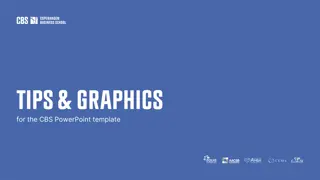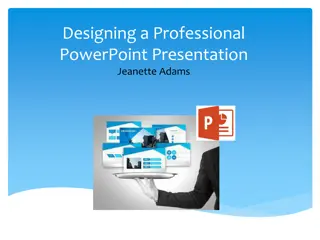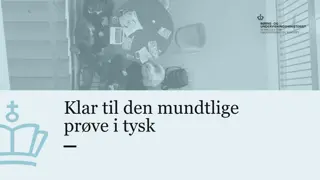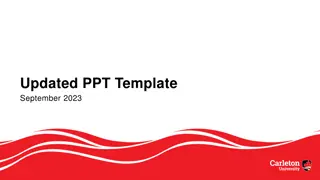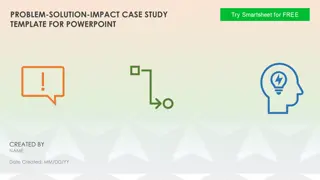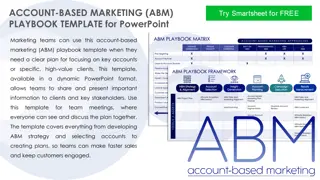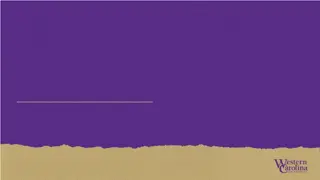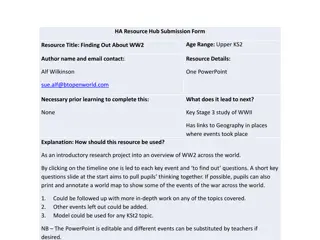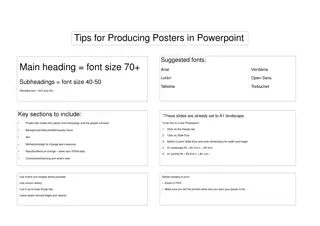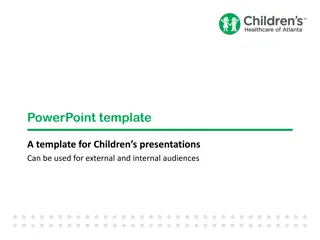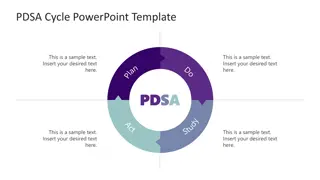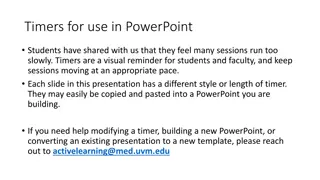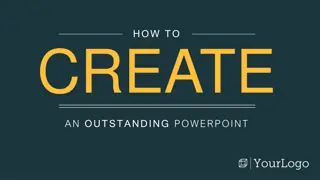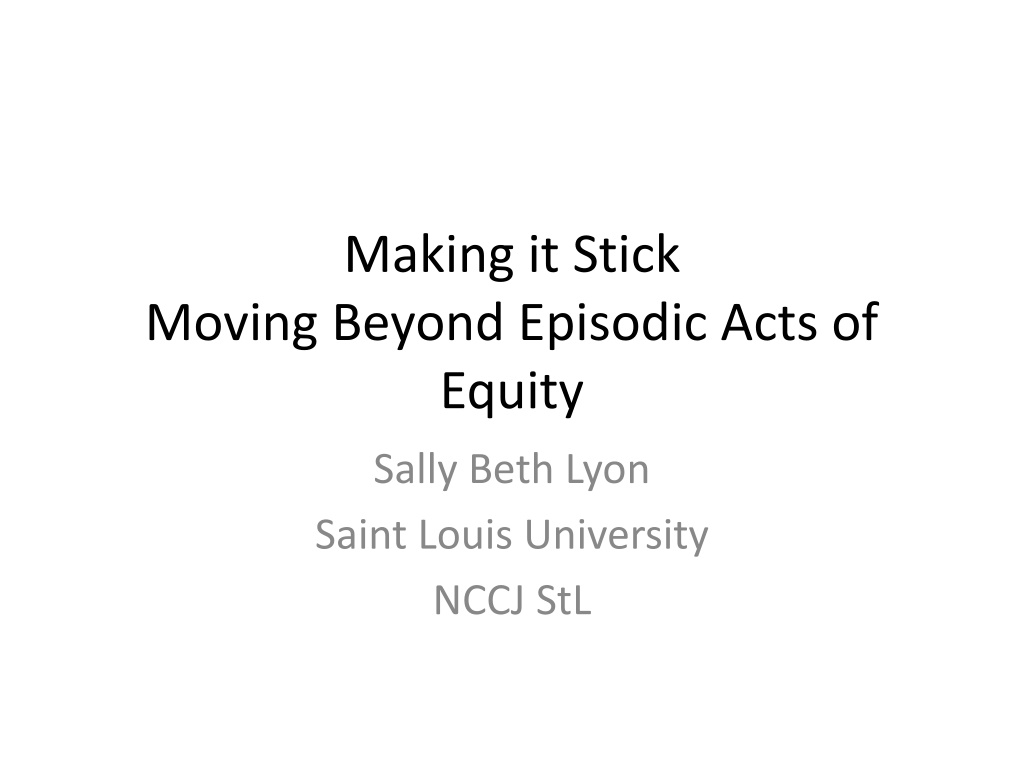
Moving Beyond Episodic Acts of Equity with Systemic Change
Explore the journey towards sustainable social justice education and systemic change, featuring learning goals, community norms, and cultural competence models. Engage in courageous conversations, enhance organizational playbooks, and embrace discomfort for growth.
Download Presentation

Please find below an Image/Link to download the presentation.
The content on the website is provided AS IS for your information and personal use only. It may not be sold, licensed, or shared on other websites without obtaining consent from the author. If you encounter any issues during the download, it is possible that the publisher has removed the file from their server.
You are allowed to download the files provided on this website for personal or commercial use, subject to the condition that they are used lawfully. All files are the property of their respective owners.
The content on the website is provided AS IS for your information and personal use only. It may not be sold, licensed, or shared on other websites without obtaining consent from the author.
E N D
Presentation Transcript
Making it Stick Moving Beyond Episodic Acts of Equity Sally Beth Lyon Saint Louis University NCCJ StL
Our Journey Thinking about it Doing something Now what? Becoming systemic Integrating Leading
Learning Goals Participants will learn about one district's process to create the internal capacity for sustainable social justice education, and the strategies used to deploy that capacity to create systemic change. Participants will learn about key theoretical frameworks that comprise the content of our learning, such as socialization and systems of privilege and oppression, and will experience some of the facilitation skills and processes that create psychological safety for courageous conversations. Participants will consider their own next steps to design or enhance their organization's playbook for social justice education and systemic change.
Community Norms Listen Participate Refrain from side conversations Take care of yourself Be honest (embrace honesty) Don t disclose others personal information without their consent
Community Norms Have respect for differences Speak in the I Ensure all voices are heard Acknowledge and embrace dissent and conflict (they re vital to our community) Work an issue, not a person Trust the process Lean into discomfort
We Stand on Your Shoulders MSAN s influence: Colleagues, Conferences, Collaboration Episodic acts of equity District models and encouragement
Cultural Competence Logic Model Teaching and Learning: Curriculum, Assessment, Intervention Teaching and Learning: Curriculum, Assessment, Intervention Culturally Competent Beliefs and Practices Student Support Three Student Support Three Tier Model Tier Model Family and Community Involvement Family and Community Involvement Diversified and Highly Effective Staff Diversified and Highly Effective Staff Tools Process Safe Environment Atmosphere of Trust, Support, and Learning Relationships Leadership Team Plan Act Measure Equity Curriculum Professional Development Survey Tools Audit Tools Equity Coaching Data Analysis District Schools Columbia Public Schools
Searching for Systemic Considering partners Finding NCCJ and a social justice framework Facilitrainer Certification Program (FTCP) 3 day retreat, 7 days of facilitation training, 2 day practice workshops Building internal capacity The Equity Team: counselors, administrators, me
Theoretical Frameworks Guiding Assumptions Matrix of Multiple Identities Cycle of Socialization The Cube Cycle of Liberation
Guiding Assumptions People are not born with prejudice. Prejudice and bias are learned through experience. We are all members of many social identity groups, based on race, gender, ethnicity, class, age, ability, sexual orientation, religion and others. Our experiences based on our group membership vary depending on our location, degree of comfort, group identification, level of awareness, life experiences, etc. Conflict often happens in interactions between people of different groups because they have been systematically socialized into dynamics of dominance and subordination.
Guiding Assumptions Central to these dynamics is a system of power that gives unearned privileges to members of some groups, which we call agent groups, while, at the same time, oppressing members of other groups, which we call target groups. There is a third group with a different relationship to power, which we call border. Privilege, recognized or not, is a social and economic benefit to those who receive it. It includes unearned, often unquestioned and unconscious advantages, entitlements, benefits, choices, assumptions, and expectations some people have based solely on their membership in certain social groups. Oppression takes many forms, including prejudice, discrimination, marginalization, powerlessness, exploitation, violence, and cultural imperialism. These are experienced by some people based solely on membership in certain social groups.
Guiding Assumptions While all people have some prejudices and biases toward other groups, not all groups can enforce their attitudes through institutions and systems of power. All forms of oppression are interconnected, and our experiences with one social identity (for example, gender) may vary greatly because of the ways in which they intersect with our experiences of another identity (for example, race). There is no hierarchy of oppression. While it can be helpful to talk about how different forms of oppression are similar or different, it is not useful to argue about which is worse. Each form of oppression is destructive to the human spirit, and if one were eliminated, the existence of the others would still affect us all.
Facili-trainers Creating psychological safety Self-disclosure Hot buttons Agendas: Encounter activity Information Processing ORID Next Steps and Action Plans
Listening Partners (Listening with Ting) Listening deeply and thoroughly is fundamental to effective dialogue. TING is a Chinese word for listening. In written form it is composed of several parts, each of which can be a word in itself. These words, which are essential to deep and thorough listening, are ears, mind, eyes and heart. Listen with your ears, to hear the word, the tone and the pitch Listen with your mind, to understand, to analyze and to broaden perspective Listen with your eyes, to see the facial expression, to read the body language, and to look at the window of the soul Listen to your heart, to feel the emotions, to empathize, to respond What would you like to share about your socialization experiences?
Now What? OK we re trained Start with us We need to do the work ourselves We can give you feedback We can roll it out if we know what it is
First Equity Team Trained Training with secondary guidance Young people to Anytown Building more Capacity 8 more Equity Team members trained Training with the Cabinet Trained all Secondary principals, APs 8 more Equity Team members trained Embedded in New Teacher PD More work with guidance More students to Anytown Beginnings of AVID, EOS Trained Elementary principals, APs Plan in place for each secondary school 8 more Equity Team members trained Year Three New Teacher PD More students to Anytown A-E-O More Equity Team members trained Plan in place for each elementary school Secondary School Plans Continue More students to Anytown A-E-O
Menu of Offerings Consultation with school leadership teams 45 90 minute awareness sessions Book studies Day long workshops (BIC, IR) 3 day retreats
NCCJSTL Unconscious Conscious Behaviors Attitudes Columbia Public Schools
Our Theory of Change A Just Society Systems Change Individual Change Resulting in elimination of disparities and social justice for all Eliminate institutionalized sources of inequity Understanding Improve cultural literacy in individual relationships and interactions Professional Development Understand the role of difference Address cultural competence
Integrating Achievement, Enrichment, Opportunity: A E O AVID, EOS, contracting for honors Anytown, MAC Scholars, Gifted Programming Discipline alternatives (ACE, Day Treatment) Restorative Practices By the end of the 2016-17 school year, CPS will have 14 certified RP trainers
Leading Community Partners Cradle to Career United Way Community Impact Health Department, City of Columbia University of Missouri, Stephens College, Columbia College
Nuggets Do something It s OK to start without knowing the end game Build internal capacity: sustainable, less reversible, systematically deployed Partnering with a local agency helped us maintain continuity and build capacity as the work expanded You can lead in your community No new FTE Only cost is training Equity Team provides training and also influence in their day jobs
Thank You! Sally Beth Lyon lyonsb@slu.edu 573-819-3319 http://www.nccjstl.org/ https://www.youtube.com/watch?v=GFd56W 2w7zg (CPS Equity Team presentation to BOE)


